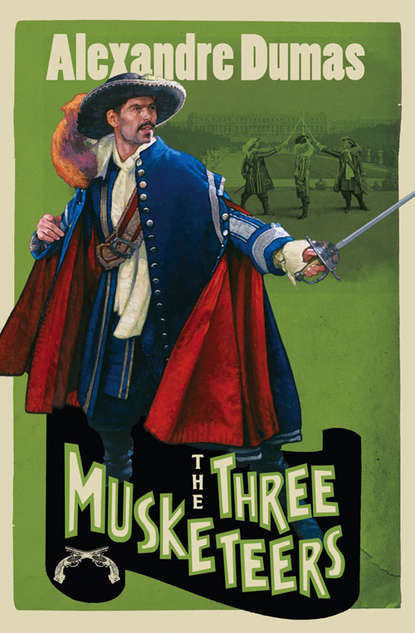По всем вопросам обращайтесь на: info@litportal.ru
(©) 2003-2024.
✖
The Three Musketeers
Автор
Год написания книги
2018
Настройки чтения
Размер шрифта
Высота строк
Поля
“Do you know the subject of their conversation?”
“He gave her a box, which he said contained her instructions, and desired her not to open it until she arrived in London.”
“Was this woman an Englishwoman?”
“He called her ‘my lady.’”
“It is he,” murmured Treville: “it must be; I thought he was at Brussels.”
“Oh, sir,” exclaimed d’Artagnan, “if you know this man, tell me who and whence he is, and I will hold you absolved even of your promise to admit me amongst the musketeers; for before and above everything else, I long to avenge myself.”
“Beware, young man,” said M. de Treville. “Should you perceive this man walking on the one side of the street, instead of seeking your revenge, proceed yourself on the opposite side; precipitate not yourself against such a rock, upon which you will assuredly be shattered like glass.”
“That fear will not deter me, should I ever meet him,” said d’Artagnan.
“In the meantime, do not seek him,” replied Treville.
“If you take my advice———”
But all at once M. de Treville paused, as if struck by a sudden suspicion: the deadly hatred which the young traveller so openly avowed for this man who had deprived him of his father’s letter—which was in itself a very improbable circumstance—might not this apparent enmity conceal some perfidy? Was not this young man sent by his eminence? Did not he come to lay a trap for him? Was not this pretended d’Artagnan an emissary of the cardinal, whom the latter sought to introduce into his house, and whom he wished to place near him to worm himself into his confidence, and afterwards to betray him, as was often done in similar cases? He looked more earnestly at d’Artagnan than at first, and was but slightly reassured by the appearance of that countenance, beaming with acute talent and affected humility. “I know very well that he is a Gascon,” thought he; “but he is just as likely to be one for the cardinal as for me. Yet I will try him further.”
“Young man,” said he slowly, “as the son of mine ancient friend—for I consider the history of this lost letter as true—I wish, in order to compensate for the coolness which you perceived in my first reception, to reveal to you the secrets of our politics. The king and the cardinal are the best of friends; their apparent disputes are merely to deceive fools; and I do not wish that my countryman, a handsome cavalier, a brave youth, formed to rise in the world, should be the dupe of all these pretences, and, like a simpleton, rush headlong into the snare which has made awful examples of so many others. Rest assured, that I am entirely devoted to these two all-powerful masters, and that all my serious proceedings can never have any other object in view than the service of the king, and of the cardinal, who is one of the most illustrious geniuses that France has ever produced. Now, young man, regulate your conduct by this; and should you, through your family or connections, or even your instincts, bear the slightest hostility towards the cardinal, such as you may have seen burst forth occasionally amongst our nobility, take your leave, and quit me. I can assist you in a thousand ways, without attaching you to my own person. At all events, I hope my frankness will make you my friend, for you are the first young man to whom I have as yet spoken in this manner.”
Treville ceased speaking, but he thought to himself, “If the cardinal has really sent me this young fox, he would not surely fail—he who knows how much I loathe him—to tell his spy that the best way of paying court to me, is to rail at himself. Therefore, in spite of my protestations, the cunning fellow will doubtless say that he holds his eminence in detestation.”
The result, however, was far different from M. de Treville’s anticipations. D’Artagnan replied, with the utmost simplicity, “Sir, I am come to Paris with sentiments and intentions exactly similar to those you have just expressed. My father charged me to obey no one but the king, the cardinal, and yourself, whom he considers the three greatest men in France.” D’Artagnan, it will be perceived, added M. de Treville to the others, but he considered that this addition would do no harm. “Hence,” he continued, “I have the greatest veneration for the cardinal, and the most profound respect for his actions. It is, therefore, so much the better for me, sir, if, as you say, you speak frankly to me, since you will then do me the honour to esteem this similarity of opinions; but if, on the contrary, as may be very natural, you entertain any feelings of distrust respecting me, so much the worse, as I shall then feel that I am ruined by speaking the truth. But in any case, you will at least honour me with your esteem, which I value more than anything else.”
M. de Treville was astonished. So much penetration, and yet so much candour, excited his admiration, although they failed in wholly removing his doubts. The more superior this youth was to other young men, the more formidable a traitor would he make. Nevertheless, he grasped d’Artagnan’s hand, and said to him, “You are an honest fellow; but at present I can only do for you what I have promised. In the meantime, my hotel shall always be open to you; so that, having access to me at all times, and being ready to take advantage of every opportunity, you will probably hereafter obtain what you desire.”
“That is to say,” replied d’Artagnan, “that you will wait till I have become worthy of it. Very well,” he added, with Gascon familiarity; “rest assured that you will not have to wait long;” and he bowed to retire, as if the future lay with himself.
“But wait a moment,” said M. de Treville, stopping him; “I promised you a letter to the director of the Academy. Are you too proud to accept it, my little gentleman?”
“No, sir,” replied d’Artagnan; “and I will answer for it that the same fate that overtook my father’s letter shall not occur to this, which I will take good care shall reach its destination; and woe be to him who shall attempt to deprive me of it.”
M. de Treville smiled at this gasconade, and leaving his young countryman in the embrasure of the window, where they had been talking, sat down to write the promised letter of introduction. In the meantime, d’Artagnan, who had nothing better to do, beat a march on the window, looking at the musketeers, who had followed each other, and watching them rounding the corner of the street. M. de Treville, having written the letter and sealed it, approached the young man to give it to him; but at the very moment when d’Artagnan held out his hand to receive it, M. de Treville was astonished to perceive his protégé spring up, redden with anger, and rush out of the cabinet, exclaiming—
“‘Od’s blood! he shall not escape me this time!”
“And who is he?” demanded M. de Treville.
“It is he—the robber!” replied d’Artagnan. “Oh, what a traitor!”—and he vanished.
“Deuce take the madman!” murmured M. de Treville, “unless it is, after all, a clever mode of giving me the slip, seeing that he has failed in his attempts.”
4 The Shoulder of Athos, the Belt of Porthos, and the Handkerchief of Aramis (#ulink_d72af13f-5382-56e8-8b26-7b8ed0c227f4)
D’ARTAGNAN, QUITE FURIOUS, had passed through the antechamber in three bounds, and reached the staircase, which he was about to descend by four steps at a time, when he suddenly ran full butt against a musketeer, who was leaving M. de Treville’s suite of rooms by a private door, and butting his shoulder, made him utter a cry, or rather a howl. “Excuse me,” said d’Artagnan, trying to continue his course; “excuse me; I am in a great hurry.”
But he had hardly descended the first step, before a hand of iron seized him by the scarf and stopped him. “You are in a hurry!” exclaimed the musketeer, as pale as a sheet, “and under this pretext you dash against me. You say, ‘Excuse me,’ and think that is sufficient. But it is not so, my young man. Do you imagine, because you heard M. de Treville address us somewhat bluntly today that any one may speak to us as he speaks? Undeceive yourself, comrade: you are not M. de Treville?”
“Upon my word—“said d’Artagnan, seeing that it was Athos, who, after the treatment of the surgeon, was now returning to his apartments—“upon my word, I did not run against you on purpose; and not having done it on purpose, I said, ‘Excuse me.’ It appears to me, therefore, quite sufficient. Nevertheless, I repeat—and this time perhaps it is an excess of courtesy—that, upon my honour, I am in a hurry, a confounded hurry: loose me, therefore, I beseech you, and permit me to go about my business.”
“Sir,” said Athos, releasing him, “you are by no means polite; it is evident that you come from a distance.”
D’Artagnan had already descended three or four steps, but at the remark of Athos, he stopped short. “Sir,” said he, “from whatever distance I may come, I assure you that you are not the individual to give me a lesson in good manners.”
“Perhaps I am,” replied Athos.
“Ah! would that I were not in such a hurry,” exclaimed d’Artagnan, “and that I were not running after some one!”
“Monsieur in a hurry! you will find me without running; do you understand?”
“And where, may it please you?”
“Near the Carmes-Deschaux.”
“At what hour?”
“About twelve o’clock.”
“Very well, I will be there.”
“Take care that you do not make me wait too long,” said Athos, “for I tell you plainly, at a quarter past twelve, it is I that will run after you, and cut off your ears as you go!”
“Good!” exclaimed d’Artagnan; “but I will take special care to be there at ten minutes before twelve.”
And he commenced running again as if possessed by devils, hoping still to catch the unknown, whose slow pace could not yet have carried him beyond his reach. But at the corner of the street Porthos was talking with one of the soldiers on guard, and between these two there was just space enough for a man to pass. D’Artagnan fancied that this space was sufficient for him, and he shot forward to rush like an arrow between the two. He had not, however, made allowance for the wind, which, whilst he was passing, actually bellied out the enormous cloak of Porthos, into which he fairly plunged. Doubtless Porthos had cogent reasons for not abandoning this most essential portion of his dress; and therefore, instead of letting go the corner which he held, he drew it more closely towards him, so that d’Artagnan found himself rolled up in the velvet, by a rotatory motion which is clearly explained by the obstinate resistance of Porthos.
D’Artagnan, hearing the musketeer swear, wished to escape from under the cloak, which completely blinded him, and sought for an outlet from the folds. Above all things he feared that he had injured the freshness of the magnificent belt, of which we have heard so much; but on recovering his powers of vision he found his nose jammed between the shoulders of Porthos; that is, exactly on the belt. Alas! like the majority of the fine things of this world, which are only made for outward show, the belt was of gold in front, and of simple leather behind. In fact, Porthos, proud as he was, being unable to afford a belt entirely of gold, had procured one of which the half at least was of that metal. And this may perhaps account for the cold under which Porthos had avowed himself as suffering, and the consequent need of the cloak.
“‘Od’s-boddikins!” cried Porthos, making every effort to free himself from d’Artagnan, who kept poking his nose into his back; “you are mad to throw yourself in this manner upon people.”
“Excuse me,” said d’Artagnan, reappearing from beneath the shoulder of the giant, “but I was in a hurry; I am running after some one———”
“Do you shut your eyes when you run?” demanded Porthos.
“No,” answered d’Artagnan, somewhat piqued, “no; and, thanks to my eyes, I can see what others do not see.”
Whether Porthos understood him or not, he yet gave way to his anger. “Sir,” said he, “you will get yourself chastised, if you thus rub against the musketeers.”
“Chastised, sir!” said d’Artagnan; “your expression is harsh.”
“It is such as becomes a man who is accustomed to face his enemies.”
“Ah, by St. Denis,” replied d’Artagnan, “I know well that you would not turn your back upon yours!” and the young man, delighted with his joke, marched off, laughing outrageously.
Porthos foamed with anger, and was hastening after him; but d’Artagnan turned and said—

















